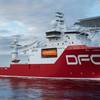MOU to Develop Zero-Emission Fuel Cell Power Plant
ABB and Ballard Power Systems signed a Memorandum of Understanding (MoU) on developing the next-generation fuel cell power system for sustainable marine e-mobility.
The fuel cell power system, to be jointly designed, developed and validated by ABB and Ballard Power Systems, is anticipated to play a significant part in accelerating the industry-wide adoption of sustainable solutions for marine e-mobility, and help ship-owners meet the increasing demands for clean operations.
ABB and Ballard Power Systems will leverage the existing kilowatt-scale fuel cell technologies and optimize them to create a pioneering megawatt-scale solution suitable for powering larger ships. With an electrical generating capacity of 3MW (4000 HP), the new system will fit within a single module no bigger in size than a traditional marine engine running on fossil fuels.
“This MoU is a significant next step in our ongoing relationship with ABB, the innovative market leader in marine solutions,” said Rob Campbell, Chief Commercial Officer at Ballard Power Systems. “The rapidly evolving marine market represents an exciting growth opportunity for zero-emission fuel cell technology. And, Ballard’s prior development and deployment of megawatt-scale containerized PEM fuel cell systems for land-based use gives us the critical experience and knowledge to collaborate effectively on the development of clean energy solutions for key marine market applications.”
Fuel cell systems can have various applications for vessels, such as providing power for a ship’s hotel operations during the time of docking, or for powering the propulsion when ships are at sea. During the initial phase, the collaboration will focus on the development of fuel cell power systems for passenger vessels.
The proton exchange membrane fuel cells (PEM) convert the chemical energy from hydrogen into electricity through an electrochemical reaction. They involve no combustion, converting fuel directly to electricity, heat and clean water. With the use of renewables to produce the hydrogen, the entire energy chain can be clean.
“The next generation of ships – electric, digital and connected – will require energy sources that are not only able to meet the increasing demands for fuel efficiency, but will also enable cleaner and safer shipping,” said Peter Terwiesch, president ABB's Industrial Automation division.
ABB is already actively involved in collaborative development of the fuel cell technology for marine applications, including research, testing and a pilot installation implementation.













